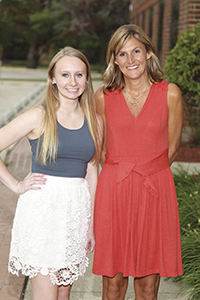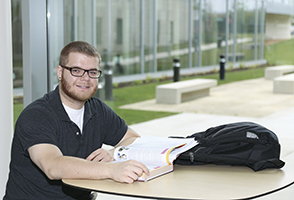By RENEE STOVSKY
Ellie Cole, 16, is beginning her junior year at Prospect High School in Mt. Prospect, Ill., this fall. A straight-A student and former cheerleader, she happily spends her free time volunteering, hanging out with friends and thinking about future college plans.
Two years ago, however, when she entered Prospect High as a freshman, life was much different for Ellie. She was transitioning from a small parochial school with 60 students per grade — a place she still refers to as her "second home" — to a public school with 600 per grade. And while many kids in similar situations can become temporarily overwhelmed, Ellie felt such anxiety that she begged her mother to let her stay home.

Student Ellie Cole, left, and Jackie Rhew of Alexian Brothers' school anxiety/school refusal treatment program. Photo credit: Alexian Brothers Health System
"Ellie had always taken awhile to adjust to a new school year, but her behavior that fall became extreme," recalls her mother, Eileen Cole. "She sobbed every morning, refused to get out of bed, and had terrible stomachaches. She insisted that her teachers hated her and that she couldn't do the work. From the very first day, she desperately wanted to change schools. She was really in a great deal of pain."
Alarmed, her mother made an appointment for Ellie to see licensed professional counselor Jackie Rhew, the assistant director of the school anxiety/school refusal program at Alexian Brothers Behavioral Health Hospital in Hoffman Estates, Ill. After an assessment, Rhew gave Ellie an ultimatum — either go to school the next day, or go to the hospital's school anxiety program.
"There was no way I was going to go to school, so I went to the hospital," Ellie says.
Coping strategies
The hospital's program, based on a cognitive behavioral therapy model, helps kids ages 12 to 18 face their fears without using poor coping strategies such as avoidance or distraction.
Begun in 2008, the outpatient program now serves more than 30 students per day, according to Cecelia Horan, director of child and adolescent services at Alexian Brothers and co-director of the school anxiety/school refusal program. Though most participants are from the greater Chicago area, others have come from as far away as Virginia or Florida, staying in hotels during treatment, which typically lasts two to four weeks before kids transition back to their home schools.
Patrick McGrath, Horan's co-director as well as director of Alexian Brothers Center for Anxiety and Obsessive Compulsive Disorders, says the treatment protocol used to treat school anxiety is modeled on the work of Christopher Kearney, a professor of clinical child psychology at the University of Nevada, Las Vegas. (See info box.)
Kearney recognized that school anxiety and school refusal, while common childhood behavior problems, run on a spectrum from the rare episodic to the severe. If serious school anxiety issues are unaddressed, the consequences can be long-lived everything from academic problems, social alienation and family conflict to delinquency and occupational and marital problems in adulthood.
First bell
Participants attend the school anxiety treatment program at Alexian Brothers Behavioral Health Hospital from 8 a.m. to 3 p.m. Monday through Friday. Mornings begin with a check-in and a goal setting strategy for the day. Each child will be asked to venture outside of his or her individual comfort zone. (For example, if being tardy to school causes anxiety, a student will practice waiting outside a room for five minutes and then entering a classroom late.) Participants focus on anger management, substance abuse and other behaviors in group therapy before going to a classroom where tutors assist with homework assignments provided by their home schools. After that, students meet with case managers in assigned groups with others battling the same core issues.
After lunch, there is more group therapy and another hour of classroom work before dismissal.
In addition to that daily routine, Rhew says, there are weekly intensive parent training sessions, family nights where parents and children come together to learn coping and behavior management strategies, and individual family therapy meetings.
Just breathe
"Over the years, we've learned that kids are at highest risk for developing (school anxiety/school refusal disorder) during the middle school years or whenever they transition to a new school," says Rhew. "We also have found that math and gym classes are most problematic for kids, due to academic stress and worries about body image and social acceptance."
Rhew says kids who avoid school-related situations that cause distress are taught anxiety-reducing techniques — everything from breathing and deep relaxation techniques to squeezing squishy balls or taking a walk to self-calm. Students who dread evaluative situations learn strategies to deal with perfectionism, obsessive compulsive disorder and social phobia. And parents whose kids pursue attention from others and tangible rewards outside of school — be they drugs or video gaming — are taught to provide strict structure and set and enforce tough boundaries at home.
Re-entry to school
When participants are deemed ready to "graduate" from the program, educational advocates visit school personnel to come up with transition plans to help kids return, both academically and emotionally, to their regular classrooms.
Many children continue therapy privately on an ongoing basis and continue to need accommodations at school, but Horan claims the program has an 85 percent to 90 percent success rate.
"I still don't like going to school; I feel like I'm there to pass, not to really learn," says Ellie. "But my anxiety is not an issue anymore — I have the coping skills to deal with it."
Of course, experiences and outcomes are different for every participant.
Survival skills
Jim Morrison, 20, of Lake in the Hills, Ill., had been teased and bullied by peers most of his school life due to his size. "I was always a taller, more heavyset kid, and other kids made fun of the way I looked," he remembers.
"A gentle giant" is the way his mother, Karen Morrison, describes him. "J.T. didn't like rough and tumble play — he was quiet, a real homebody," she says.

Jim Morrison, a graduate of Alexian Brothers Behavioral Health Hospital’s school anxiety/refusal program, learned to manage his anxiety and build his self-esteem through the program. Photo credit: Alexian Brothers Health System
By sophomore year at Harry D. Jacobs High School in Algonquin, Ill., Morrison says he couldn't take the social isolation anymore. He was treated for depression at Alexian Brothers, but when he returned to school, he refused to take antidepressant medications.
"Four months later, I just snapped. I felt suicidal, and I drove myself back to the hospital," Morrison says.
This time, he spent nine days as an in-patient, started taking his medication and then entered the school anxiety program. "Since my anxiety was based largely on low self-esteem, I would engage in exposure therapies like standing in front of a mirror," he says. "Once I could overcome my fear, I realized how irrational it was."
Morrison returned to school in time to take final exams. "I felt I had the tools and support in place to manage my anxiety; for example, I learned to carry a journal with me and write in it whenever I felt the need," he says.
Confidence builder
Senior year "went really well," Morrison says, mainly because he could focus on one of his key interests — music. "I had finished all my graduation requirements except a semester of English, so my schedule was filled with classes I enjoyed — jazz band, marching band, varsity choir, vocal jazz ensemble," he says.
Today Morrison works full time as a manager at a local PetSmart store while he finishes his associate degree in art and sciences at Elgin Community College, majoring in psychology. After that, he plans to continue his education at a satellite campus of Columbia College (in Columbia, Mo.) that is close to his home. "Ultimately I'd like to major in sports psychology and work with professional or collegiate football teams," he says.
"I still have days where I don't feel too comfortable about myself, but the program has helped me modify the way I view situations," he says. Recently diagnosed with Type 2 diabetes, Morrison, at the suggestion of Rhew, his longtime counselor, has joined a CrossFit gym and has been following Paleo Diet guidelines.
"I have gained so much confidence in myself through the intense exercise," he says. "I've lost fat, gained muscle and am more flexible than I ever thought I could be."
The program has had a significant impact in the Morrisons' family life as well. "Not only did Jim graduate from that program with focus and direction, but it helped us learn how to engage with our son," says his mother. "It used to be very hard to have idle chitchat with Jim. Now our family dinner conversations are terrific."
| Prime reasons for avoiding school
The treatment modalities that Alexian Brothers Behavioral Health Hospital uses to treat patients with severe school anxiety are largely based on the work of Christopher Kearney, a professor of clinical child psychology at the University of Nevada, Las Vegas. Kearney attributes school avoidance behaviors to a student's desire to: - avoid school-related situations that cause substantial distress
- escape painful social and/or evaluative school-related situations
- pursue attention from significant others
- pursue tangible rewards outside of school
|
Copyright © 2014 by the Catholic Health Association
of the United States
For reprint permission, contact Betty Crosby
or call (314) 253-3477.